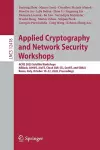
Applied Cryptography and Network Security Workshops
8 contributors - Paperback
£99.99
Dr. Man Ho Au is an assistant professor at the Hong Kong Polytechnic University. Before moving to Hong Kong, he has been a lecturer at the School of Computer Science and Software Engineering, University of Wollongong, Australia. His research expertise lies in information security and privacy. He has been an active member in the research community, having served as a program committee member of 15 international conferences in the last five years. He is also the program committee co-chair of the 8th International Conference on Network and System Security. Due to his excellent research track record, he has been appointed as the program committee co-chair of the 9th International Conference on Provable Security, to be held in Japan next year. He is an associate editor of Elsevier’s Journal of Information Security and Applications. He has served as a guest editor for various journals such as Elsevier’s Future Generation Computer Systems and Wiley’s Concurrency and Computation: Practice and Experience. Despite being an Early Career Researcher, Dr Au has contributed enormously to the research community as shown by his publication and citation records. Since 2009, he has published 18 journal articles, including the well-respected IEEE Transactions on Information Forensics and Security, IEEE Transactions on Knowledge and Data Engineering and the ACM Transaction on Information and System Security and IEEE Transactions on Vehicular Technology. This is in addition to 29 articles accepted by refereed international conferences, including the ACM Conference on Computer and Communications Security (CCS), the top conference in security and privacy research. His research has been recognized internationally, in particular in the area of privacy and accountability. Two of his papers that appeared in the ACM CCS conference were named as “Runners-up for PET Award 2009: Outstanding Research in Privacy Enhancing Technologies. Au has delivered invited talks in this area in various reputable universities around the world, including Indiana University (USA), Harbin Institute of Technology (China), the University of Electronic Science and Technology (China), Sun Yat-sen University (China), Fujian Normal University (China) and Hong Kong University (Hong Kong). His Google Scholar H-index is 20. Dr Kim-Kwang Raymond Choo is a Fulbright Scholar and Senior Lecturer at the University of South Australia. He has (co)authored a number of publications in the areas of anti-money laundering, cyber and information security, and digital forensics including a book published in Springer’s “Advances in Information Security book series and six Australian Government Australian Institute of Criminology refereed monographs. He has been an invited speaker for a number of events (e.g. 2011 UNODC-ITU Asia-Pacific Regional Workshop on Fighting Cybercrime and 2011 KANZ Broadband Summit 2011), and delivered Keynote/Plenary Speeches at ECPAT Taiwan 2008 Conference on Criminal Problems and Intervention Strategy, 2010 International Conference on Applied Linguistics and 2011 Economic Crime Asia Conference, and Invited Lecture at the Bangladesh Institute of International and Strategic Studies. He was one of over 20 international (and one of two Australian) experts consulted by the research team preparing McAfee's commissioned report entitled “Virtual Criminology Report 2009: Virtually Here: The Age of Cyber Warfare; and his opinions on cyber crime and cyber security are regularly published in the media. In 2009, he was named one of 10 Emerging Leaders in the Innovation category of The Weekend Australian Magazine / Microsoft's Next 100 series. He is also the recipient of several awards including the 2010 Australian Capital Territory (ACT) Pearcey Award for “Taking a risk and making a difference in the development of the Australian ICT industry, 2008 Australia Day Achievement Medallion in recognition of my dedication and contribution to the Australian Institute of Criminology, and through it to the public service of the nation, British Computer Society’s Wilkes Award for the best paper published in the 2007 volume of the Computer Journal, and the Best Student Paper Award by the 2005 Australasian Conference on Information Security and Privacy.